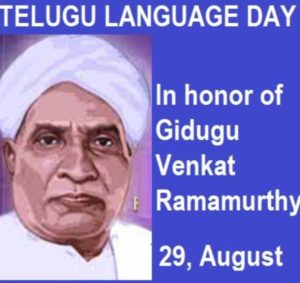“Celebrating Telugu: Honoring its Rich Heritage on Telugu Language Day. This event recognizes the cultural and linguistic significance of Telugu, showcasing its literary achievements, art, music, and contributions to society. It fosters pride among Telugu speakers and promotes language preservation. Through exhibitions, performances, and discussions, the day underscores the language’s historical importance, its role in shaping regional identity, and its global impact. It’s a time to appreciate Telugu’s beauty, evolution, and ongoing relevance, while encouraging its use and propagation for generations to come.”
Table of Contents

History Of Telugu language Day
Telugu Language Day, also known as Telugu Bhasha Dinotsavam, is celebrated on August 29th every year to honor and promote the Telugu language and its rich cultural heritage. The significance of this day is rooted in the efforts of Gidugu Venkata Ramamurthy, a renowned Telugu linguist and social reformer.
Gidugu Venkata Ramamurthy is credited with simplifying the script of the Telugu language, making it more accessible to the masses. His efforts led to a more widespread literacy and usage of Telugu. To commemorate his contributions and to celebrate the Telugu language, Telugu Language Day was officially recognized and established.
On this day, various cultural events, seminars, workshops, and competitions related to Telugu literature, art, and language are organized. It’s an occasion for Telugu-speaking people to come together, celebrate their linguistic identity, and raise awareness about the importance of preserving and promoting their language.
Telugu Language Day holds a special place in the hearts of Telugu-speaking communities, as it serves as a reminder of the linguistic diversity and cultural heritage that are an integral part of their identity.
Why To Celebrate Telugu language Day?
Celebrating Telugu Language Day is a tribute to the rich cultural heritage of Telugu-speaking people. It honors the language’s contribution to literature, art, and society. This day encourages linguistic diversity and unity, fostering a sense of identity and pride. Through events, discussions, and cultural activities, Telugu Language Day promotes language preservation and encourages future generations to embrace and cherish their linguistic roots. It’s an opportunity to reflect on the language’s significance, its impact on history, and its role in shaping the cultural tapestry of the region. Overall, celebrating Telugu Language Day is a celebration of language, culture, and heritage.
How To Celebrate Telugu language Day?
Telugu Language Day, also known as Telugu Bhasha Dinotsavam, is celebrated on August 29th each year to honor the Telugu language and its rich cultural heritage. Here are some different ways to celebrate this day:
1. Organize Cultural Events: Arrange cultural programs, traditional music and dance performances, and theatrical presentations that highlight the beauty and diversity of the Telugu language and culture.
2. Language Workshops and Seminars: Conduct workshops, seminars, and discussions on the history, literature, and linguistic aspects of the Telugu language. Invite scholars and linguists to share their insights.
3. Essay and Poetry Competitions: Hold competitions for essay writing, poetry recitation, and storytelling in Telugu. This encourages participants to engage with the language and showcase their creativity.
4. Telugu Book Fair: Organize a book fair featuring Telugu literature, poetry, novels, and educational materials. This promotes reading and supports local authors and publishers.
5. Online Campaigns: Utilize social media platforms to share interesting facts, quotes, and anecdotes about the Telugu language. Encourage people to use Telugu hashtags and share their own stories related to the language.
6. Language Pledge: Organize a ceremony where participants take a pledge to promote and preserve the Telugu language, emphasizing its importance in daily life.
7. Cultural Exhibitions: Set up exhibitions showcasing Telugu art, craft, textiles, and artifacts. This helps attendees connect with the cultural heritage of the language.
8. Film Screenings: Screen Telugu movies or documentaries that celebrate the language, literature, and history of the Telugu-speaking regions.
9. Language Awards: Recognize and honor individuals or organizations that have made significant contributions to the promotion and preservation of the Telugu language.
10. Community Outreach: Collaborate with local schools, colleges, and community centers to spread awareness about Telugu Language Day and engage students in language-related activities.
Remember, the goal of Telugu Language Day celebrations is to foster a sense of pride and appreciation for the language while promoting its continued use and growth.
Significance
Telugu Language Day holds immense cultural and historical importance as it celebrates the rich heritage of the Telugu language, spoken predominantly in the Indian states of Andhra Pradesh and Telangana. This day commemorates the birth anniversary of Gidugu Venkata Ramamoorty, a visionary linguist who championed the simplification of Telugu script. It symbolizes linguistic unity, regional pride, and the preservation of linguistic diversity. Telugu Language Day promotes awareness about the language’s unique literary contributions, fostering a sense of identity among speakers. It also underscores the need to protect and promote endangered languages, contributing to a more inclusive and vibrant linguistic landscape.
Conclusion
In conclusion, Telugu Language Day is a celebration that holds immense cultural and linguistic significance. It serves as a reminder of the rich heritage, literature, and contributions of the Telugu language and its speakers. The day promotes linguistic diversity and encourages the preservation of indigenous languages in an increasingly globalized world. As we commemorate Telugu Language Day, let us appreciate the beauty and depth of Telugu, and continue to cherish and promote our linguistic diversity for generations to come.
Click on the following link
